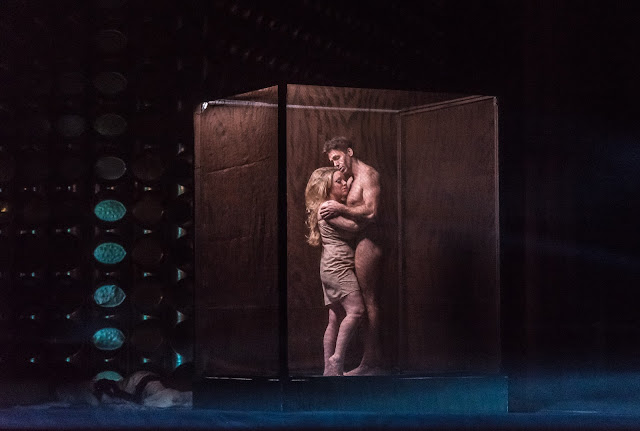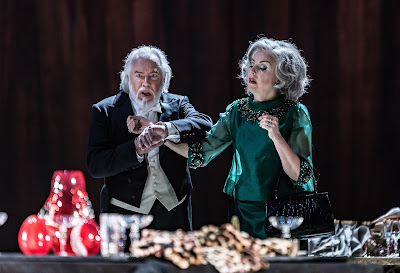 |
| Ed Lyon, Sophie Bevan - Thomas Adès The Exterminating Angel - © ROH, photo Clive Barda |
Reviewed by Robert Hugill on May 3 2016
Star rating: 4
Buñuel's elusive drama turned into a seductively mysterious opera
 |
| Amanda Echalaz, Charles Workman © ROH, photo Clive Barda |
Based on Luis Buñuel's 1962 film El ángel exterminador, Adès' opera uses a libretto by Tom Cairns (though I gather Adès had quite a lot of input). The film is based around a dinner party for 17 people who mysteriously get trapped in the room unable to leave. Though Cairns and Adès had reduced the dinner party guests down to 12, this still meant there was a huge cast (see below) which included the servants and the dinner guests. The production was a striking who's who of distinguished opera stars. One of the notable points about the piece was the way that it seemed to give opportunities for a wide range of singer and ages, in fact having such well known performers in many of the roles certainly helped towards identification. There is no real protagonist in the opera, Adès is more interested in the collective than the individual, creating instead a series of striking character roles
Though Buñuel was somewhat reticent about the meaning of the film, apart from its obvious satire of human behaviour as the elegant dinner party guests are reduced to more primitive behaviour (and there are of course intriguing links to William Golding's 1954 novel Lord of the Flies). But the film is widely regarded as a comment on Franco's Spain of the period (early 1960s). The production style kept the piece firmly in period, with a semi-abstract set which was clearly mid-century, and costumes and wigs perfectly in period too.
 |
| John Tomlinson, Anne Sofie von Otter - © ROH, photo Clive Barda |
The story telling, in terms of the combination of opera and dramaturgy, was excellent so that after the first scene it quickly became clear who was whom. Adès and Cairns successfully led us through the complexities of the plot without ever seeming to. The long first half, 75 minutes (Acts One and Two) intrigued, but it was in Act Three that the drama really gripped as people started to fall apart at the seams. There is a death (through illness), a mutual suicide pact from the young lovers, various species of madness, some failed witch-craft, a woman cradling a dead sheep's head singing to her (absent) young son, the killing and consuming of sheep, and even a rogue bear.
 |
| Iestyn Davies, Sally Matthews - © ROH, photo Clive Barda |
One particular feature of the vocal writing was the way Adès took the high voices to the limit and above. Not only did Audrey Luna sing in the stratosphere, but Amanda Echalaz's Lucia spent a great deal of time very high in her range, as did the tenors. The result could not have been anything but Adès, and I have to confess that I found it tiring at times. The sheer insistency of the sound of high voices pushed high, detracted from the striking textures elsewhere in the orchestration and the high notes drew unwarranted attention to themselves. It was somewhat of a relief to get to the more beaten down characters in the final act, when stratospheric notes reduced accordingly. It was in his writing for the other voices, such a lovely solo for Christine Rice's Blanca, that the real beauty of Adès vocal writing came out, and it was Rice who managed to tug the heart strings most.
 |
| Christine Rice, Sally Matthews, Anne Sofie von Otter - © ROH, photo Clive Barda |
There are plenty of self-referential jokes woven into the piece, at one point someone asks for Blanca to play some Adès, the fire on which the lamb is roasted comes from burning the wood from a cello which is broken up, and Adès includes a number of wry quotations into the orchestra.
Thomas Adès drew superb performances from the large cast and the orchestra, and the whole had a wonderful complexity texture which certainly seduced as much as the drama intrigued. Each of the soloists contributed strongly, but the overall effect was of a remarkable ensemble with none of the artists seeming to stand out against the others. On heretical thought did occur to me, if it was performed without the contribution of distinctive stars such as John Tomlinson, Anne Sofie von Otter, Christine Rice, Iestyn Davies, Thomas Allen etc., would it be so easy to determine who is whom in this complex piece. Perhaps the operas life after these first performances will demonstrate its real role in the operatic pantheon.
This is the sort of piece that I feel I need to return to, such is the complexity both of Adès music and of the drama itself. Adès and Cairns make no obvious point about what is happening, but you feel that Adès music is leading us through a very distinct emotional counterpoint to the mysterious drama. And it was this that I would like to return to and explore further.
Thomas Adès - The Exterminating Angel
Royal Opera House, 3 May 2017
Leonora - Anne Sofie von Otter
Bianca - Christine Rice
Nobile - Charles Workman
Lucia - Amanda Echalaz
Raúl - Frédéric Antoun
Doctor - John Tomlinson
Roc - Thomas Allen
Francisco - Iestyn Davies
Eduardo - Ed Lyon
Leticia - Audrey Luna
Silvia - Sally Matthews
Beatriz - Sophie Bevan
Lucas - Hubert Francis
Enrique - Thomas Atkins
Señor Russell - Sten Byriel
Colonel - David Adam Moore
Julio - Morgan Moody
Pablo - James Cleverton
Meni - Elizabeth Atherton
Camila - Anne Marie Gibbons
Padre Sansón - Wyn Pencarreg
Yoli - Joshua Abrams
Elsewhere on this blog:
- Fresh and distinctive: Walton's Facade with Zeb Soanes, Carole Boyd and John Wilson - CD review
- Winning combination: Liza Ferschtman in Mendelssohn - CD review
- Music for devotion: Margaret Rizza's The Celtic Collection - CD review
- Creative re-imaginings: Mark Bowler's Quartet for Strings - CD review
- For the love of the voice: My interview with Ian Rosenblatt, founder of Rosenblatt Recitals - interview
- Aztec Dances: New works for recorder and piano from Jill Kemp - CD review
- Strong stuff: Alberto Ginastera's Bomarzo at Teatro Real, Madrid - Opera review
- Capturing the zeitgeist: Benjamin Appl and James Baillieu in recital at Wigmore Hall - concert review
- From Figaro to Cabaret: Elena Langer on her recent operatic projects - interview
- Music is One: Korean, Japanese and Western musicians collaborate at Club Inégales - concert review
- Home







%20TallWall%20Media_Oxford%20Song.jpg)
%20TallWall%20Media_Oxford%20Song.jpg)
%20TallWall%20Media_Oxford%20Song.jpg)


No comments:
Post a Comment